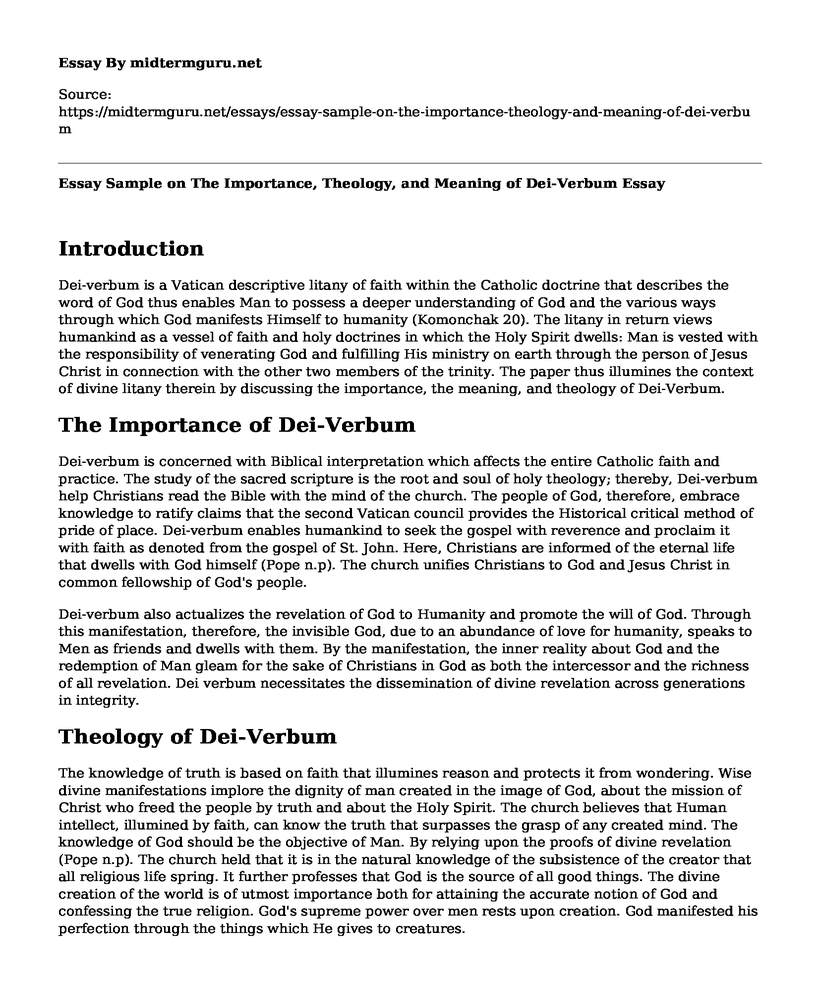Introduction
Dei-verbum is a Vatican descriptive litany of faith within the Catholic doctrine that describes the word of God thus enables Man to possess a deeper understanding of God and the various ways through which God manifests Himself to humanity (Komonchak 20). The litany in return views humankind as a vessel of faith and holy doctrines in which the Holy Spirit dwells: Man is vested with the responsibility of venerating God and fulfilling His ministry on earth through the person of Jesus Christ in connection with the other two members of the trinity. The paper thus illumines the context of divine litany therein by discussing the importance, the meaning, and theology of Dei-Verbum.
The Importance of Dei-Verbum
Dei-verbum is concerned with Biblical interpretation which affects the entire Catholic faith and practice. The study of the sacred scripture is the root and soul of holy theology; thereby, Dei-verbum help Christians read the Bible with the mind of the church. The people of God, therefore, embrace knowledge to ratify claims that the second Vatican council provides the Historical critical method of pride of place. Dei-verbum enables humankind to seek the gospel with reverence and proclaim it with faith as denoted from the gospel of St. John. Here, Christians are informed of the eternal life that dwells with God himself (Pope n.p). The church unifies Christians to God and Jesus Christ in common fellowship of God's people.
Dei-verbum also actualizes the revelation of God to Humanity and promote the will of God. Through this manifestation, therefore, the invisible God, due to an abundance of love for humanity, speaks to Men as friends and dwells with them. By the manifestation, the inner reality about God and the redemption of Man gleam for the sake of Christians in God as both the intercessor and the richness of all revelation. Dei verbum necessitates the dissemination of divine revelation across generations in integrity.
Theology of Dei-Verbum
The knowledge of truth is based on faith that illumines reason and protects it from wondering. Wise divine manifestations implore the dignity of man created in the image of God, about the mission of Christ who freed the people by truth and about the Holy Spirit. The church believes that Human intellect, illumined by faith, can know the truth that surpasses the grasp of any created mind. The knowledge of God should be the objective of Man. By relying upon the proofs of divine revelation (Pope n.p). The church held that it is in the natural knowledge of the subsistence of the creator that all religious life spring. It further professes that God is the source of all good things. The divine creation of the world is of utmost importance both for attaining the accurate notion of God and confessing the true religion. God's supreme power over men rests upon creation. God manifested his perfection through the things which He gives to creatures.
The Meaning of Dei-verbum
Dei verbum is a Vatican draft of the assertive constitution that defends the foundation of the faith of the catholic believers and church. The document outlines the serious duty to defend the deposit, the mind of the Vatican synod, the knowledge of truth among other doctrinal teachings of the catholic faith (Pope n.p). Based on the footsteps of the council of Trent, and the First Vatican Council, the present council presented wishes to set forth mandatory doctrine on divine revelation. This became Dei-Verbum.
Works Cited
Komonchak. Draft of a Dogmatic Constitution Defending Intact the Deposit of Faith. 2012.
Pope, Paul (IV). Dogmatic Constitution in Divine Revelation Dei Verbum Solemnly Promulgated. 1965.
Cite this page
Essay Sample on The Importance, Theology, and Meaning of Dei-Verbum. (2023, Feb 09). Retrieved from https://midtermguru.com/essays/essay-sample-on-the-importance-theology-and-meaning-of-dei-verbum
If you are the original author of this essay and no longer wish to have it published on the midtermguru.com website, please click below to request its removal:
- Jesus Christ Reconciliation
- Essay on Biblical Principles for Generosity
- Essay on Welton's Article: Can Buddhism Save the World?
- Husbands and Wives, Marriage and Household Codes in Christianity - Religion Essay Example
- The Kind of Life of Jesus Possible to Write - Essay Sample
- Jesus in Islam: Who He Was and His Mission - Essay Sample
- Cultural Visit: Exploring a New Culture and Life Adventuring - Essay Sample







